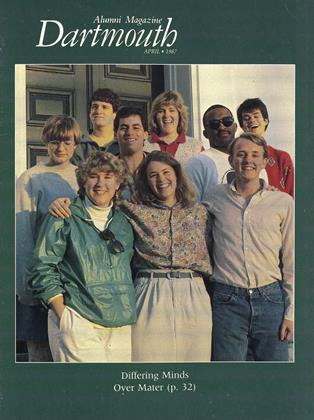William S. Lind '69 and U.S. Senator Gary Hart are authors of America Can Win: The Case for Military Reform (Adler & Adler, Bethesda, Md., 1986, 301 pp., $17.95). Their central contention is that, despite great expense, the United States does not today possess an effective conventional defense and that unless a different approach is undertaken immediately the nation is headed for disaster. "More importantly, this book seeks to outline the steps necessary to reform our military and political institutions, to change the kinds of weapons we buy and the way we buy them, and to change the way we think about our defense in this revolutionary era."
The authors call for fundamental change in weapons, force structure, officer education, troop training, field tactics, and military organization. They stress the need for adopting a strategy of maneuver warfare as opposed to outmoded attrition warfare, which relies on heavy firepower and inflicting casualties. The German blitzkrieg and Israeli victories are cited as examples of the former. The book also argues that the U.S. should recognize the vulnerability of the giant aircraft carrier and build its navy around the submarine; that the officer corps should be reduced in size and revitalized in tactical and strategic training; and that the military should improve planning and testing and increase competition in weapons development and procurement.
Senator Hart is a co-founder of the Military Reform Caucus made up of more than 130 Senators and Congressmen of both parties. He is also a member of the Senate Armed Services Committee. Lind, a defense advisor to Senator Hart since the mid70s, is a resident scholar with the Institute for Government and Politics and serves as president of the Military Reform Institute. He is the author of Maneuver Warfare Handbook, published in 1985.
CHARLES WIDMAYER
Nancy Wasserman '77, Nathan Hine '78, Ben Bradley, and Judith Vollmann are editors of Por Amor Al Pueblo: Not Guilty! (Front Porch Publishing, 1986, 166 pp., $9.95). ForAmor Al Pueblo: Not Guilty! opens to public scrutiny the outrageous and disturbing stories that the New York Times refused to print and NBC would not touch. Not since Cambodia have I read an account to which the American people have more urgent right than this well-edited transcript of the trial of the Winooski 44. I am deeply grateful to the four people who gathered two years ago on a Vermont front porch and decided that the burden of editing, printing, and publishing this book was theirs.
Days before a critical Senate vote on Nicaragua in March of 1984, 44 citizens refused for over 70 hours to leave the Winooski office of U.S. Senator Robert Stafford (R-Vt.). They wanted their senator to stop voting for military aid to Central America and to hold a public meeting on the issue. He refused and 26 of the protesters were arrested. Nine months later, in a packed and sweltering courtroom in Burlington, Vermont, 12 jurors found all 26 defendants not guilty of unlawful trespass. After hearing the evidence, the jury accepted the defendants' plea of necessity, granting that their trespass had been as urgently mandated as that of a person who rushes into a burning building to save a life. Senator Stafford was also convinced, and since the trial he has become a tireless opponent of Reagan's policies in Central America.
Here are the exact words of the six defendants who took the stand and the defense's expert witness - among them three former CIA officials, two Central American refugees, a former U.S. Attorney General, an anthropologist, a historian, a sociologist, a political scientist, an epidemiologist, an economist, and an international lawyer.
The CIA officer who commanded the 1975-76 covert action in Angola describes the Agency's manipulation of Congress and the media: "The job of one-third of my staff, the professional writers and professional film people, was to introduce [untruthful] stories into the media." His evidence is corroborated by a political scientist who consulted for the State Department: "The CIA and Defense Department . . . were trying to pull a fast one on Congress in particular, and perhaps the rest of the country as well." An insurgency expert who served with the CIA from 1981 to 1983 describes the origins of the Contra war: "Basically, the contras have been organized, directed, and led by the United States government." A Stanford anthropology student tells of being strafed daily in El Salvador by machine gun fire from U.S. Army helicopters: "We were hitting the dirt, getting up and running as fast as we can, [and] the sound of screaming babies was attracting their machine fire . . . and there was a little boy, a grenade had landed on him and taken off his legs."
This is not pretty - but it is not dull. Not even the legalisms of a courtroom (most have been mercifully excised) can stifle the heart-rending drama of this testimony. Behind the protest, the trial, and the publication of this important book beat the hearts of ordinary people with a great deal of faith in our compassionate response to what they have to tell us.
SHELBY GRANTHAM
 View Full Issue
View Full Issue
More From This Issue
-
 Feature
FeatureFor the Love of Dal Bat
April 1987 By Thomas J. Frazer '82 -
 Cover Story
Cover StoryShould The College Change Its Tune?
April 1987 By Jay Heinrichs -
 Feature
FeatureWish You Were Here
April 1987 By Marshall Ledger '61 -
 Feature
FeatureThe Debate Over Safe Sex Lands Dartmouth on "Donahue"
April 1987 By Lee Michaelides -
 Cover Story
Cover StoryALL TOGETHER NOW ...
April 1987 -
 Article
ArticleRobert Kaiser '39: Economic expertise is his planned gift to Dartmouth
April 1987 By Deborah Hodges







